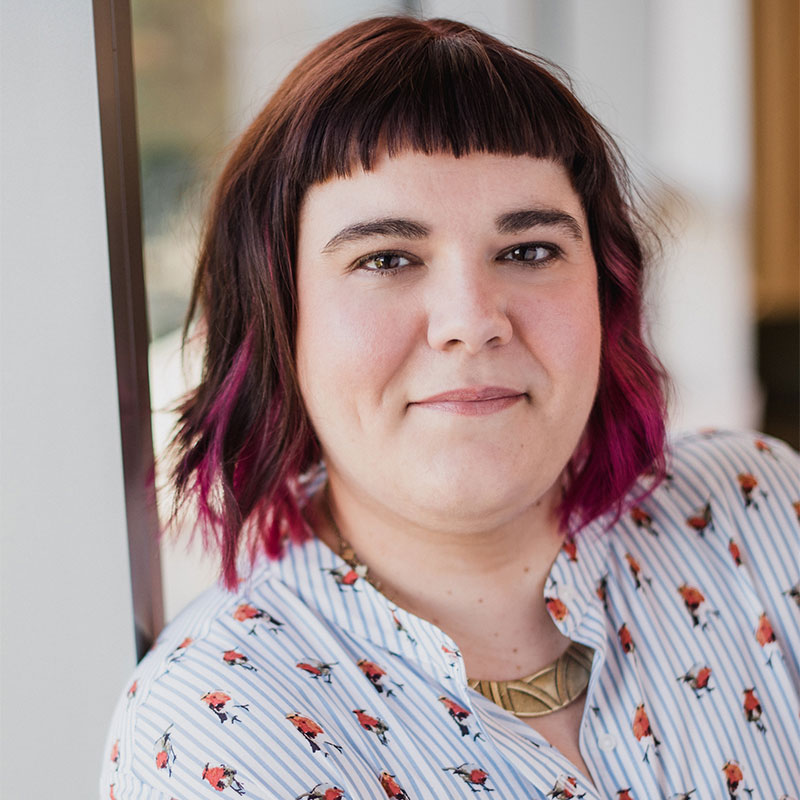How to Build a Purposeful Online Community with Sophie Bujold
Sophie Bujold is an expert in community-building, so I sat down to chat with her about creating a profitable community strategy and the pitfalls leaders often experience.

It makes me so darn happy to be able to share this interview with you all. Sophie Bujold, founder of Cliqueworthy, joined me for an illuminating discussion about building a community online. I hired Sophie last year to help me grow and shift my business, and that has been the best decision I’ve ever made in my business.
I’m still working on building out everything that she and I created in our strategy sessions, so you’ll see it in action soon, but I couldn’t keep her all to myself any longer. She’s a treasure trove of marketing, brand building, and community wisdom! You can watch the full video above, listen to the audio version on iTunes, or read a recap below. Enjoy!
How did you first get involved in community building?
It’s a space that I’ve been in since the ’90s. I saw the power that meeting other people from other places in the world held, and how connecting with them and creating a shared experience really had an impact on my life. I even met my husband in an online chat room! When I started in the workforce, the internet was really just taking off. I was the megaphone for the fact that we could use those channels to start creating connections with people. At the time though, people didn’t believe you could use a machine to create a human connection.
I think I very unconsciously made it my mission at that point to say, “Let me show you how and let me prove you wrong on that.”
The rest of the work that I’ve done since then has really been centered around how we use technology and the internet to create as human as possible of an experience for people. I branched out on my own about eight years ago and started teaching things like social media marketing in the context of how do you use those tools – not only to market yourself – but to really create an authentic connection with your audience so that they feel that you have their best interests at heart. This, of course, helps business in the long run.
What is your business focus now with Cliqueworthy?
Nowadays, I help people who either have membership communities, online courses, or a business where they want the community to sit at the center. I help make that happen in a way that’s manageable, profitable, and sustainable. Another aspect is about creating a place where people love to be, where they’re sharing with one another and they’re connecting with other people who might be doing the same thing.
What is the difference is between an audience and a community?
Over the years, the word “community” has been morphed into this concept of anyone who follows what you have to say is part of your community. For me, that’s not what defines a community – that’s an audience.
An audience is usually found on things like Facebook pages, Instagram profiles, Twitter accounts, and even email lists. Yes, that audience is in a kind of a group, but the only thing that links those people together is the fact that they’re following you and listening to what you have to say. But, if you remove yourself from the equation, most of those people will likely drift off and go on to other things and listen to other people.
In a community, the bonds are decentralized. So if you – the leader – goes away, chances are that people in the community will still want to talk to one another and the community can live independently.
That doesn’t mean that you don’t still play a role – you still must set the tone of the conversation and guidelines. What it means is that you could essentially remove yourself from the equation, and there is still an ecosystem there of people who care about each other, who are rooting for each other, who are really engaged around a common topic. That really doesn’t exist with an audience.
Is having a common purpose important in an online community?
Absolutely. Most people will not gather if there’s no purpose to the group. There needs to be a commonality.
You need to really get in touch with why a community needs to exist and what purpose it’s going to serve in the life of the people it’s helping.
The reason I’m such an advocate of this is because it makes decision-making a million times easier when you understand what your mission is with whatever you’re creating. That is a universal truth for marketing too. But, I have seen a ton of communities out there that haven’t gotten clear on their purpose, and those are usually the ones that start stumbling. In my mission to make these things sustainable for my clients, it’s really important that we understand what we want to be delivering and what we want to help people connect on.
What are important questions entrepreneurs should ask themselves when diving into a deeper purpose for their community?
- What does this community need to do you for you?
- What does this community need to do for its members?
- What is the transformation you want to facilitate?
Every person who works with me gets asked those questions and we spend a lot of time reflecting on it before we ever talk about the format of the community. I always encourage people interested in community building to come with their curiosity and a spirit of being open to what comes out throughout the process. Because if not, it could become very mechanical an all about formats, tactics, and content. But it really must have a deeper meaning in it if you want to make it sustainable in the long term.
We do the same as business owners when we’re creating services or products and we forget to ask: “What do I need out of this and where’s the intersection between what the customer wants and what I need?”
That’s really the sweet spot of what you need to create. If it’s too focused on the customer, you’re going to get overwhelmed, bored, or feel like you want to just give it up. From the customer side, if it’s too heavily focused on you, they’ll feel like you have an agenda, and they’ll start tuning you out.
What trends do you currently see happening with communities online?
Focusing on the format before purpose has become a huge pitfall. Online marketers are great at these kinds of pitches. There’s nothing wrong with them, but “community” has been the latest trend in what they use to market their services. What’s come out of that is commoditization of community, where it’s seen this big tactic as opposed to being a place of gathering. There’s a place for those marketing groups absolutely, but I think for people like you or for the clients that I work with, they want to create something that’s for the long term, that they enjoy, that’s really valuable, and that has an impact.
You really just can’t do that by taking the blueprints that are floating out there and just applying it to you because that blueprint wasn’t created for you. It doesn’t have your why in it. It doesn’t have who you are and it doesn’t have your zone of genius of how you operate in the world.
Unless you’re able to make that transition yourself into thinking strategically with that blueprint, chances are it just won’t work and you’re going end up with something that you’re really struggling to either keep up with or just not really enjoying. I’ve seen that so many times.
What does a business owner need to do before creating a community?
It certainly doesn’t hurt to have an audience already built, but I wouldn’t necessarily let that stop someone from wanting to create a community environment. Here are two major things I look for in people who are ready to do the work:
- Some experience under your belt and knowing what works and what doesn’t work in your business.
- A basic or even intermediary understanding of your customer and what they want.
- The fact that you’ve been able to sell your product or sell your services fairly consistently and successfully.
These few things mean you’re past that hump of understanding what will work in terms of how you can help people. Those are the basic minimum, and a few additional wishlist items include:
- A rough idea of what you want to deliver or the impact that you want to have with that community.
- A reason why you think community might be the best way to deliver what you want to deliver.
- An understanding of how a community fits into your business model.
- You’ve started to at least build your email list and make will ings easier as well.
What are the elements of a successful community vs. one that flounders?
The first crucial element in successful community interactions is value. Where most people tend to get caught up when creating or sustaining an existing community is too specific, worrying about how many posts they need to do per week, what do they need to say, and all those things. I have seen communities that have meaty, valuable posts once a month or once a couple of weeks, and they do fine. Others can post every day with super tailored content, and that works well too. It’s less about the mechanics of content and more about the value you provide. Ensure that your content aligns with what your tribe needs.
A great little mental trick is to think about how you would do something in real life. Ask yourself: “If I were interacting with this person or these people in a room face-to-face, how would that interaction go? Once you have the answer, do the work to emulate that online as closely as possible.
The second crucial element is realizing that even though you are the leader or the creator of the community, the community is really not about you. I see people failing in their communities because they believe it’s their right and their opportunity to market to people 24/7. It becomes about dropping truth bombs or asking simplified questions instead of having a real conversation with people.
There’s a lot of communities that are falling in that trap right now. They get set-up for a product launch, and there’s a lot of activity during that time, then they drop off, then they come back and it’s another launch. But there’s never any ongoing conversation. There’s no entertaining. There’s no relationship building. They are treated like things that just serve a business, and not the people in it.
Lastly, you must know the transformation you want to facilitate and the steps someone takes before, during, and even at the end of their time in your community. This again comes back to purpose, and really understanding, what want people to get out of this. There must be a transformation that happens. Even if someone has gotten what they needed to get out of the community and decide to leave, you want to know how they’ve changed and why.
Any insights on marketing a community?
Marketing has its place, and I would never say don’t look at marketing tactics. But to me, the real power in everything that I do has really come from creating a connection with people. That doesn’t come from ads or the perfect funnel, although those things have their purpose.
Obviously, you have to market the community at some point to get members in it. But once that starts rolling, marketing costs usually end up going down because what you’re creating is this environment of people who are your brand champions. They believe in you and they’re joining this because they understand your goals. The more value you can create and the more you can connect people with one another, the more buy-in you’ll have once it’s time to start selling things. Your tribe will trust you and recommend you to others easily from there.
The conversation in a community should never start with, “Look at what I’m selling.” It should be, “How can I help you?”From that, people will naturally start asking, “What can I buy from you?”
It may not be everyone, but if you do it right, you’ll see it.
Would you be willing to share what your overarching, motivating intention is for both your life and your business?
My purpose is as a connector. I connect things and people, whether it is online or offline – that’s just what I do. I facilitate connection and I make sure that the connection is solid and sustainable.
It’s been such a strong drive for me my entire life.
Being on the internet so early on, that’s what attracted me: the ability to connect and learn about people, and have these interesting and deep conversations with total strangers about all kinds of things. Even in my personal life, I live in an apartment building and I’m the one who started the community library downstairs so people could read good books and start connecting that way.
Once you asked me the question, I started seeing my purpose everywhere in my life and my business.
Want to learn more about Sophie’s work?
Sophie Bujold is the founder of Cliqueworthy, a boutique consultancy focused on helping digital business builders, online group hosts and membership site providers design and grow outstanding community experiences. She taps into more than 18 years of experience in communications, digital marketing, and online community building to help her clients use technology and online tools to bring people together in genuine and impactful ways. Find Sophie on Social: Instagram Find Cliqueworthy on social: Facebook | Twitter | Linkedin






